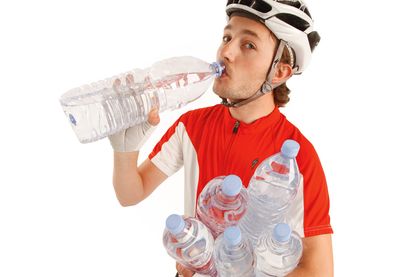Don't drink so much water during exercise, new research says
Scientists have reportedly found that mild dehydration during exercise is less dangerous than first thought, with over-hydration possibly a bigger issue among athletes

Drinking a lot of water during exercise could be more dangerous than not drinking enough, according to a collection of research published in the Wall Street Journal.
It’s a commonly heard opinion that dehydration affects performance levels, but now experts are warning that ‘waterlogging’ the body is more harmful.
>>> The complete guide to sports drinks: Hydration
In 2007, sports scientist Kate Mori fell ill and became delirious during running the London Marathon after drinking a reported 3.5 litres of liquid in small amounts – significantly more than she required.
“I’d always been taught you had to 'stay ahead’ of thirst and that being thirsty was a sign you were already dehydrated,” she told the Telegraph in 2012.
Now, researchers are saying that three per cent dehydration levels during competition, which was previously considered harmful, don’t hurt your performance at all.
>>> Is milk a good rehydration option?
Get The Leadout Newsletter
The latest race content, interviews, features, reviews and expert buying guides, direct to your inbox!
In a study, to be published in the Scandinavian Journal of Medicine & Science in Sports, 11 cyclists were dehydrated three per cent, and then asked to undertake a 20km time trial in a laboratory.
The cyclists reportedly showed no drop in performance, having been equipped with obscured intravenous lines so they didn’t know how hydrated they were.
In fact, a study of marathon runners in France in 2009 showed that athletes who lost a higher percentage of body weight through dehydration recorded better times than those whose weight remained the same.

Thank you for reading 20 articles this month* Join now for unlimited access
Enjoy your first month for just £1 / $1 / €1
*Read 5 free articles per month without a subscription

Join now for unlimited access
Try first month for just £1 / $1 / €1
Stuart Clarke is a News Associates trained journalist who has worked for the likes of the British Olympic Associate, British Rowing and the England and Wales Cricket Board, and of course Cycling Weekly. His work at Cycling Weekly has focused upon professional racing, following the World Tour races and its characters.
-
 Hire and hire: Bike rental schemes hit record numbers in the UK, almost topping 25 million rides
Hire and hire: Bike rental schemes hit record numbers in the UK, almost topping 25 million ridesAn average of 67,565 rides were taken a day between September 2022 and September 2023, an increase of 24%
By Adam Becket Published
-
 Egan Bernal says he has regained his pre-crash form, but others have improved
Egan Bernal says he has regained his pre-crash form, but others have improvedColombian, who suffered traumatic training accident in 2022, aiming for return to Tour de France
By James Shrubsall Published